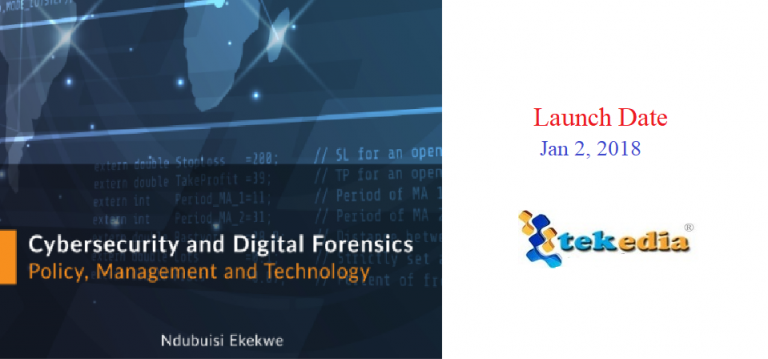
We have finalized all elements of the new book – Cybersecurity and Digital Forensics: Policy, Management and Technology. It will be available to present, old and new subscribers from Jan 2, 2018 here on Tekedia. For marketing purposes, it does not make sense to publish a book in December. That is why it will be unveiled next month; we do not want it to be old within few days.
It is a very comprehensive book on cybersecurity policy, cybersecurity management, cybersecurity technology, cybersecurity intelligence, and digital forensics. You will like it.
As always, one Tekedia subscription makes all our wares available to you.
Register for Tekedia Mini-MBA edition 19 (Feb 9 – May 2, 2026): big discounts for early bird.
Tekedia AI in Business Masterclass opens registrations.
Join Tekedia Capital Syndicate and co-invest in great global startups.
Register for Tekedia AI Lab: From Technical Design to Deployment (next edition begins Jan 24 2026).
TABLE OF CONTENTS
Beginning
Preamble
About the Author – Ndubuisi Ekekwe, PhD
Structure of Information Systems
1.0 Computer Fundamentals
1.1 Fundamentals of Internet
1.2 Number Systems
1.3 Information System and Business
Information Security
2.0 Access Control Techniques
2.1 Account Administration
2.2 Account Accessibility
2.3 Authentication Techniques
Network Vulnerabilities
3.0 Networking Types, ISO Model
3.1 Networking Devices, Topologies
3.2 IP Address, MAC Address & Ports
3.3 DNS & DHCP Server
3.4 Network Vulnerabilities & Types of Attacks
Foundation of Cybersecurity
4.0 Hacking
4.1 Phases of Ethical Hacking
4.2 Testing
4.3 Cyber-Warfare and Cyber-Terrorism
4.4 Security Implementation and Governance
BYOD & SMAC Security
5.0 SMAC
5.1 SMAC Security & Forensics
5.2 BYOD
5.3 BYOD Security & Forensics
Preventing Cyber Intrusion
6.0 What is Cyber-Attack?
6.1 Cyber-Attack Response Plan
6.2 Compliance Plan Against Cyber-Attack
6.3 Technology for Preventing Cyber-Intrusion
Emerging Cybersecurity Tech
7.0 Emerging Cybersecurity Tech
7.1 Changing Trends in Cybersecurity
7.2 Social Media Role
7.3 Cybersecurity Techniques
7.4 Cyber Ethics
Ethical Hacking
8.0 Basic
8.1 Purpose of Ethical Hacking
8.2 Hackers -Types, Purposes and Goals
8.3 Phases of Ethical Hacking
8.4 Cyber warfare and Terrorism
Malware Analysis
9.0 Malware – Variants, Infections and Effects
9.1 Malware Analysis – Goals, Types
9.2 Method of Malware Analysis
9.3 Setup
9.4 FUD and Avoidance
Penetration Testing & Tools
10.0 Basics of Penetration Testing
10.1 PenTest – Types, Models, Methodologies
10.2 Vulnerability Assessment vs. Penetration Testing
10.3 Penetration Testing Tools
10.4 Penetration Testing Distributions
Intrusion Detection and Prevention
11.0 Intrusion Detection System (IDS)
11.1 Intrusion Prevention System (IPS)
11.2 IDS vs. IPS vs. Firewall
11.3 Common Detection Methodology
Network & OS Security
12.0 Network Security – Basics, Forms, Prevention
12.1 OS Security Threats
12.2 Cryptography-Network and OS Security
Ethics in Information Technology
13.0 Morals, Ethics, and Laws
13.1 Ethics in Business
13.2 Ethics in Information Technology
13.3 IT Policy
Security Policy Analysis
14.0 Security Policy and Law
14.1 Policy Development – Process & Lifecycle
14.2 Policy Types & Standards
14.3 Policy Troubleshooting
Security Policy Implementation
15.0 Identify Needs Issues/Threats
15.1 Identify the Policy Users
15.2 Review & Write Policy
15.3 Train and Enforce Policy
15.4 Review and Modify
Global Cybersecurity Policy & Law
16.0 Cyberspace & Cybercrimes
16.1 Information Warfare & Legal Issues
16.2 National Cybersecurity Policy & Law
16.3 International Law & Policy
16.4 Legal Process & Punishment
Enterprise Cybersecurity Policy
17.0 Enterprise Cybersecurity Policy
17.1 Vulnerability Assessment & Risk Analysis
17.2 Security Testing Frameworks
17.3 Vulnerability Prevention
17.4 Tools & Techniques
Physical & Human Security Management
18.0 Physical Security
18.1 Physical Security Threats
18.2 Planning and Executing
18.3 Physical Security Checklist
18.4 Theft and Locks Picking
Human Security Management
19.0 Human Security
19.1 Social Engineering Techniques
19.2 Dumpster Diving & Shoulder Surfing
19.3 Phishing & Countermeasure
19.4 Staff Training
Cybersecurity Essentials for Leaders
20.0 Planning & Managing Enterprise Information System
20.1 Planning & Managing Enterprise Network Structure
20.2 Privacy & Human Security Management
20.3 Planning & Managing Security Assessment & Testing
20.4 Disaster Recovery/Contingency Planning
Cyber Incident Analysis and Response
21.0 Cybersecurity Incident & Risk
21.1 Planning & preparing for Cyber Incident
21.2 Planning Cybersecurity Incident Response
21.3 Planning Risk Management
21.4 Disaster Recovery & Business Continuity
Building Secure Enterprises & Organizations
22.0 Secure Enterprises & Organizations
22.1 Scope and Approach
22.2 Business Goals & Security
22.3 Baseline Analysis & Desired State
22.4 Policy and Procedures
Cybersecurity Project Management
23.0 Cybersecurity Project Management
23.1 Key factors for Success
23.2 Frameworks for Cybersecurity Management
23.3 Implementation of Framework
23.4 Basic Tenets
Digital Forensics & Evidence
24.0 Digital Forensics
24.1 Digital Forensics Model
24.2 Approach and Process
24.3 Evidence Gathering & Assessment
24.4 Evidence Examination
SMAC & BYOD Forensics
25.0 Social Media Forensics
25.1 Mobile Forensics
25.2 Cloud Forensics
25.3 BYOD Forensics
25.4 Digital Forensics Lifecycle
Guarding Against Cyber Intrusions
26.0 Attacks, Tools for Defending Against
26.1 Privileges and Access Rights
26.2 Policy for Users and Organizations
26.3 Contingency Plan
26.4 Training
Information Systems Security & Assurance
27.0 Information Systems Security & Assurance
27.1 Information Security
27.2 Information Assurance
27.3 Information Security and Assurance
Cyber Intelligence & Counter Intelligence
28.0 Cyber Intelligence
28.1 Information for Strategic Decision
28.2 Counter Intelligence
28.3 Governments & Businesses
28.4 Incident handling & Damage control
29. Conclusion
---
Connect via my
LinkedIn |
Facebook |
X |
TikTok |
Instagram |
YouTube



